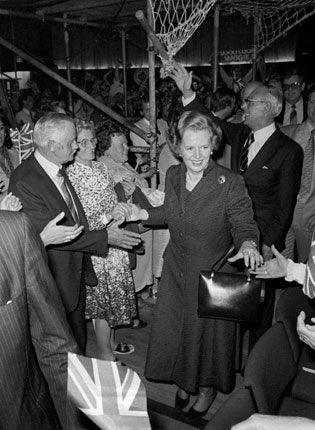Lessons from the past: why Tories oppose AV

The conservatives would have been reduced to a rump of just 70 MPs in Labour's 1997 landslide victory if that election had been fought under the Alternative Vote (AV) system, according to research based on answers given by voters at the time.
This is one of a series of statistics produced by expert analysts which demonstrate why the Conservative Party is almost unanimously opposed to changing the voting system, though it is the Tory-led Coalition which will offer voters a chance in a referendum on 5 May to switch to electing their MPs using AV.
There has been only one general election in the past 30 years when the Conservatives might have done better under AV than under the current "first past the post" system. That was when Margaret Thatcher won her third election victory, in 1987.
The research indicates that David Cameron exaggerated last week when he claimed in a speech in support of the No2AV campaign that an AV system would have produced larger Conservative majorities in the 1980s.
But he was right to say that, more recently, AV would have given Tony Blair even bigger parliamentary majorities than he achieved. The expert calculations suggest that the Labour Party would have gained under AV in every election from 1997 onwards.
In 1997, a House of Commons elected under AV would have contained 445 Labour MPs instead of the 419 actually elected, 115 Liberal Democrats, and just 70 Tories.
In 1983, when Labour had its worst election result since the 1930s, AV would have resulted in 391 Conservative MPs, instead of the actual total of 397, 190 Labour MPs instead of 209, and 48 MPs from the Liberal/SDP Alliance, instead of the 25 actually elected.
Although the party with most to gain from the switch to AV is the Liberal Democrats, the figures, collated by John Curtice at the University of Strathclyde, suggest they would not have done as well as many suppose.
The figures suggest that the only hung parliament that would have emerged from the past seven elections, if they had all been conducted under AV, would have been the current one – though in 1992, instead of securing 336 seats and an overall majority of 21, John Major's government would have been re-elected under AV with a perilously thin overall majority of six.
Part of the reason that a switch to AV would be likely to hit the Conservatives harder than Labour is that Labour voters are generally more concentrated in the cities, where the party stacks majorities that would be safe under either voting system.
In 1997, no fewer than 315 Labour MPs out of 418 received at least 50 per cent of votes cast in their constituencies, which means that the second-preference votes would not have needed to be counted in those 315 seats even if AV had applied. In that election, only 13 Conservative MPs out of 165 were elected on more than 50 per cent of votes cast.
But even in 1983, when Labour secured less than 28 per cent of the popular vote, nearly 70 Labour MPs won 50 per cent of the vote in their constituencies.
The reason AV would not automatically create hung parliaments is that when people who vote Lib Dem are asked to state their second choice, they usually prefer whichever of the two big parties is doing better in the polls.
The figures bear out the conclusion of the report on voting systems produced by the late Roy Jenkins, at Tony Blair's request. "On its own, AV would be unacceptable because of the danger it might increase rather than reduce disproportionality," he warned.
Join our commenting forum
Join thought-provoking conversations, follow other Independent readers and see their replies
Comments
Bookmark popover
Removed from bookmarks